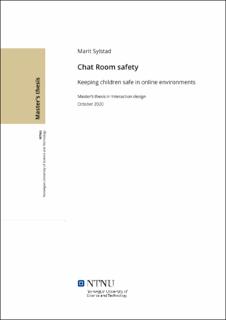| dc.contributor.advisor | Bours, Patrick | |
| dc.contributor.advisor | Volden, Frode | |
| dc.contributor.author | Sylstad, Marit | |
| dc.date.accessioned | 2021-10-16T17:21:44Z | |
| dc.date.available | 2021-10-16T17:21:44Z | |
| dc.date.issued | 2021 | |
| dc.identifier | no.ntnu:inspera:81988689:34411287 | |
| dc.identifier.uri | https://hdl.handle.net/11250/2823500 | |
| dc.description.abstract | Barn og unge bruker mer og mer av sin tid på internett. I en alder av ti har nesten alle barn tilgang til en smarttelefon. Ni av ti barn og unge i alderen ni til 18 bruker ett eller flere sosiale medier, og andelen øker med alderen. Utviklingen av internett og sosiale medier i kombinasjon med barn og unges tilgang til PC, nettbrett og andre mobile enheter gir store muligheter for mennesker som ønsker å etablere seksualisert kontakt med barn. Mange av nettstedene, sosiale medier og nettspill som er ment for og brukes av barn - brukes også av voksne som på forskjellige måter lokker barn til seksualiserte situasjoner. Gjennom grooming prosessen kan en voksen bygge et tillitsforhold og oppnå en følelsesmessig forbindelse med et barn eller en ungdom, som de senere kan dra nytte av for å manipulere, utnytte og misbruke dem. Denne oppgaven er ment å skaffe innsikt i kunnskapen om grooming og seksuelle overgripere på nettet. Gjennom dette er målet å utvikle en måte å advare barn på i live chat-samtaler.
Masteroppgaven vil være en del av prosjektet AiBA (Author Input Behavioral Analysis), som overvåker chattesamtaler gjennom atferdsbiometri og tekstanalyse for å advare brukere om falske identiteter og mistenkelig atferd. AiBA-prosjektet er gjennomført av Norsk biometri-laboratorium som er en del av Institutt for informasjonssikkerhet og kommunikasjonsteknologi ved NTNU på Gjøvik. Prosjektet har som mål å identifisere falske profiler i chatte-applikasjoner ved hjelp av en maskinlæringsmetode innen tastetrykkdynamikk og stylometri, spesielt for å beskytte barn mot seksuelle overgripere som finner ofrene sine online. | |
| dc.description.abstract | Children and young people are spending more and more of their time on the internet. By the age of ten, almost all children have access to a smartphone. Nine out of ten children and young people aged nine to 18 use one or more social media, and the proportion increases with age. The development of the internet and social media in combination with children and young people's access to PC, tablet and other mobile devices offer great opportunities for people seeking to establish sexualised contact with children. Many of the websites, social media and online games intended for and used by children are also used by adults, who in various ways entice children into sexualised situations. Through grooming, an adult can build a relationship, trust and emotional connection with a child or young person, which they later can take advantage of to manipulate, exploit and abuse them. This study is intended to acquire insight into the knowledge of grooming and online sexual predators. Through this, the aim is to develop a way to warn children in live chat conversations.
The master thesis will be part of the AiBA (Author Input Behavioral Analysis) project, which monitors chat conversations through behavioural biometrics and text analysis to warn users about false identities and suspicious behaviour. The AiBA project is conducted by the Norwegian Biometry Laboratory, which is part of the Department of Information Security and Communication Technology at NTNU Gjøvik. The project aims to identify fake profiles in chat applications using a machine learning approach within the field of keystroke dynamics and stylometry, particularly for protecting children from sexual predators that find their victims online. | |
| dc.language | eng | |
| dc.publisher | NTNU | |
| dc.title | Chat Room safety: Keeping children safe in online environments | |
| dc.type | Master thesis | |
